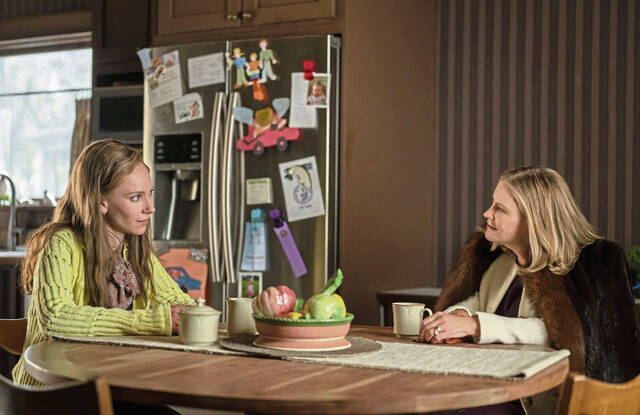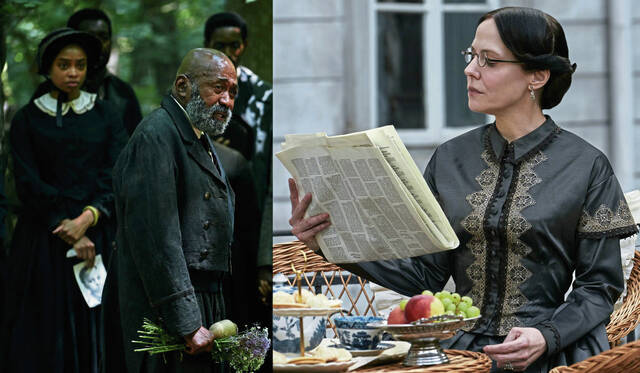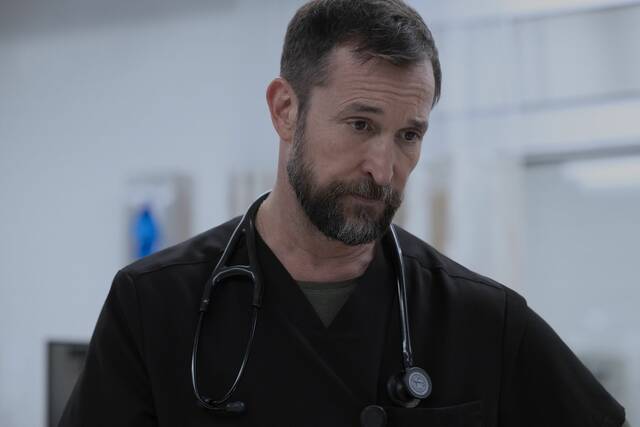Trib Total Media TV writer Rob Owen offers a viewing tip for the coming week.
Sometimes you don’t realize just how good an actor can be at their craft until you see the actor in a completely different role.
From her work as bubbly Keeley Jones on “Ted Lasso,” I would not necessarily imagine actress Juno Temple leaping next to FX’s “Fargo.” Kudos to “Fargo” showrunner Noah Hawley for seeing something in her past performances that made him think Temple would be a perfect fit to play Dorothy “Dot” Lyon, a Minnesota housewife whose past comes back to haunt her in the 10-episode fifth season of “Fargo.”
Sure, this latest season also stars Jon Hamm (“Mad Men”), Jennifer Jason Leigh (“Hunters”) and Joe Keery (“Stranger Things”), but this is unequivocally Temple’s season and yeah, sure, you betcha, she shines.
Premiering with two episodes at 10 p.m. Tuesday on FX (streaming the next day on Hulu), this latest “Fargo” is set in 2019 and begins with Dot and her daughter trying to escape a brawl at a school board meeting when Dot, fearing for her safety, inadvertently trains her taser on a cop (she also zaps a math teacher).
“Fargo” never tells viewers what the melee was about, leaving it to our imagination, but it’s not difficult to guess in this day of contentious school meetings that it could have been about any number of hot-button issues (book bans, critical race theory, DEI efforts). Ultimately, it doesn’t matter, but it does give Hawley a chance to stake his claim on the themes he wants to explore in this iteration of the anthology series.
That school auditorium fight pairs well with Hamm’s Roy Tillman, a “constitutional sheriff” in North Dakota who sees fit to enforce only the parts of the U.S. Constitution he likes. Tillman comes across as toxic masculinity personified, a guy who sees himself not only as the law but also above the law and willing to put the law on equal footing with Old Testament dogma. Viewers meet Tillman when he’s lecturing a young woman about being obedient to her abusive husband, whom Tillman roughs up, constitutional rights be damned.
A character later tells Roy, “You want freedom without responsibility. You’re fighting for your right to be a baby!”
Roy and Dot are clearly on a collision course. Roy’s weak henchman son, Gator (Keery), leads the charge.
Shaking off her brief incarceration, Dot wants her daughter and kind, milquetoast husband Wayne (David Rysdahl) to enjoy Halloween even as Dot worries when she learns Wayne’s imperious, wealthy mother, Lorraine Lyon (Leigh), knows about Dot’s run-in with the law.
Lorraine operates the largest debt collection company in the country and she has little patience for her son or her daughter-in-law. Leigh foregoes a Minnesota accent in favor of sounding like a transatlantic cartoon villain who wandered in from “Casablanca.” It’s an odd choice at first, but it fits more comfortably over time. Lorraine is a fantastic source of comedy, arranging for her family members to hold assault rifles in their Christmas card photo similar to some real-life politicians and their families. (“It’s about strength: Projection of our values as a family,” Lorraine explains.)
What’s most interesting about the new season of “Fargo” is how it ultimately pits a feminist sensibility against macho misogyny, which results in an unexpected villain-on-villain twist, strange bedfellows, etc.
Other than the series’ disappointing, Ewan McGregor-led third season, Hawley has managed to make a new, worthwhile “Fargo” each time. That’s also true with this fifth season. It’s probably wise that he waited three years since season four, allowing time for new horrors to bubble up in American culture that “Fargo” can comment upon with insight and dark humor.
In a phone interview earlier this month, Hawley said he saw elements in Temple’s “Ted Lasso” performance that he wanted from Dot.
“She has this relationship with the Roy Kent character and his niece, and I just thought, ‘Oh, I see how she’s always trying to protect other people’s feelings when they clearly made a mistake,’ ” Hawley said, adding that he needed an actor who would feel like a good mom given the amount of child endangerment in the season’s early episodes. “Juno always has this mischievous, winning quality that I thought, well, if you love her as a mother … where it’s like she’s teaching her daughter how to be resourceful, then you’ve won the audience over.”
Hawley said he went back to the 1996 “Fargo” movie for inspiration this season. Rather than a kidnapped wife who is murdered, Hawley chose to tell a story that “starts to unfold the exact same way the movie unfolds, but then something very different happens and the housewife reveals herself to be a tiger.”
Every season of “Fargo” has a connection to another “Fargo” story, and, while Hawley said he’s not deliberate about it, preferring to make a connection if an opportunity arises, there will be a tie late in season five.
Hawley said the show’s examination of truth (“this is a true story”) has roots in 2016’s politics that echo in the dialogue of Lorraine’s attorney, Danish (Dave Foley), who notes, “We’ve got our own reality.”
“That is a real thing in America,” Hawley said. “Tillman’s reality is different from (Dot’s) reality and different from (Lorraine’s) reality, and that’s such a strange thing, because you can’t convince those people that they’re wrong.
“It used to be that the worst person in the show said, ‘I’m the victim here,’ ” he continued. “Almost every season we had those moments, but then (in season two) Patrick Wilson’s character could say, ‘People are dead, Peggy,’ and you will see on Kirsten Dunst’s face the reality of that hit her, a moment of realization that she’s being selfish. And I don’t think you could get Roy Tillman to have that moment. The difference in America between 2014 and 2023 is that common understanding of what we all agree on is right and wrong. There’s this mindset now: If I do it, it’s not a crime. If you do it, it’s always a crime.”
Similarly, Hawley said he purposefully starts season five with the definition of “Minnesota nice,” which he calls “the foundational idea in the movie” that in polite society people hide their true feelings. “Fargo” then quick cuts from that notion of passive aggression to school board fisticuffs.
“Everything’s just aggressive aggression now,” he said. “There was something in the comedy of just saying the words ‘Minnesota nice’ and defining it and then showing you what that has become as a way to set the table for a story of how do decent people who still believe in selflessness and deference to social order, how do we prevail in the moment in which it seems to be just about dominance?”











